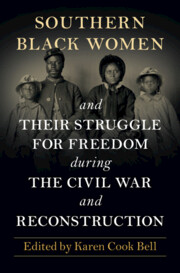Book contents
- Southern Black Women and Their Struggle for Freedom during the Civil War and Reconstruction
- Southern Black Women and Their Struggle for Freedom during the Civil War and Reconstruction
- Copyright page
- Dedication
- Contents
- Figures
- Tables
- Contributors
- Acknowledgments
- Introduction
- Part I Emancipation and Black Women’s Labor
- Part II War, Gender Violence, and the Courts
- Part III Emancipation, the Black Family, and Education
- 7 Making Their Place on the South’s Ragged Edge
- 8 Black Women’s Lives and Labors in Post-Emancipation North Carolina
- 9 Remaking Old Blue College
- Notes
- Index
9 - Remaking Old Blue College
Emerson Normal and Addressing the Need for Public Schoolteachers in Mobile, Alabama
from Part III - Emancipation, the Black Family, and Education
Published online by Cambridge University Press: 14 December 2023
- Southern Black Women and Their Struggle for Freedom during the Civil War and Reconstruction
- Southern Black Women and Their Struggle for Freedom during the Civil War and Reconstruction
- Copyright page
- Dedication
- Contents
- Figures
- Tables
- Contributors
- Acknowledgments
- Introduction
- Part I Emancipation and Black Women’s Labor
- Part II War, Gender Violence, and the Courts
- Part III Emancipation, the Black Family, and Education
- 7 Making Their Place on the South’s Ragged Edge
- 8 Black Women’s Lives and Labors in Post-Emancipation North Carolina
- 9 Remaking Old Blue College
- Notes
- Index
Summary
Hilary Green examines this aspect of freedom by considering Emerson Normal School and institution-building in the postwar era and the important role of education in the lives of formerly enslaved women in Mobile, Alabama. Green posits that Emerson Normal was instrumental in permitting former slaves as well as the children born after the end of slavery to become teachers, administrators, and, most important, leaders within their communities. Emerson Normal represented the expansion and refinement of the educational partnership between Black Mobilians and the American Missionary Association after the creation of state-funded public schools. This partnership played a critical role in creating the corps of teachers required for the new public school system. Outside the classroom, graduates employed their preparation for middle-class leadership by actively participating in racial uplift organizations and campaigns. Never viewing their service as limited to the classroom, Emerson Normal graduates became an essential asset for Black Mobilians and their slow, arduous struggle for African American public education and racial equality in Mobile.
- Type
- Chapter
- Information
- Southern Black Women and Their Struggle for Freedom during the Civil War and Reconstruction , pp. 160 - 176Publisher: Cambridge University PressPrint publication year: 2023

